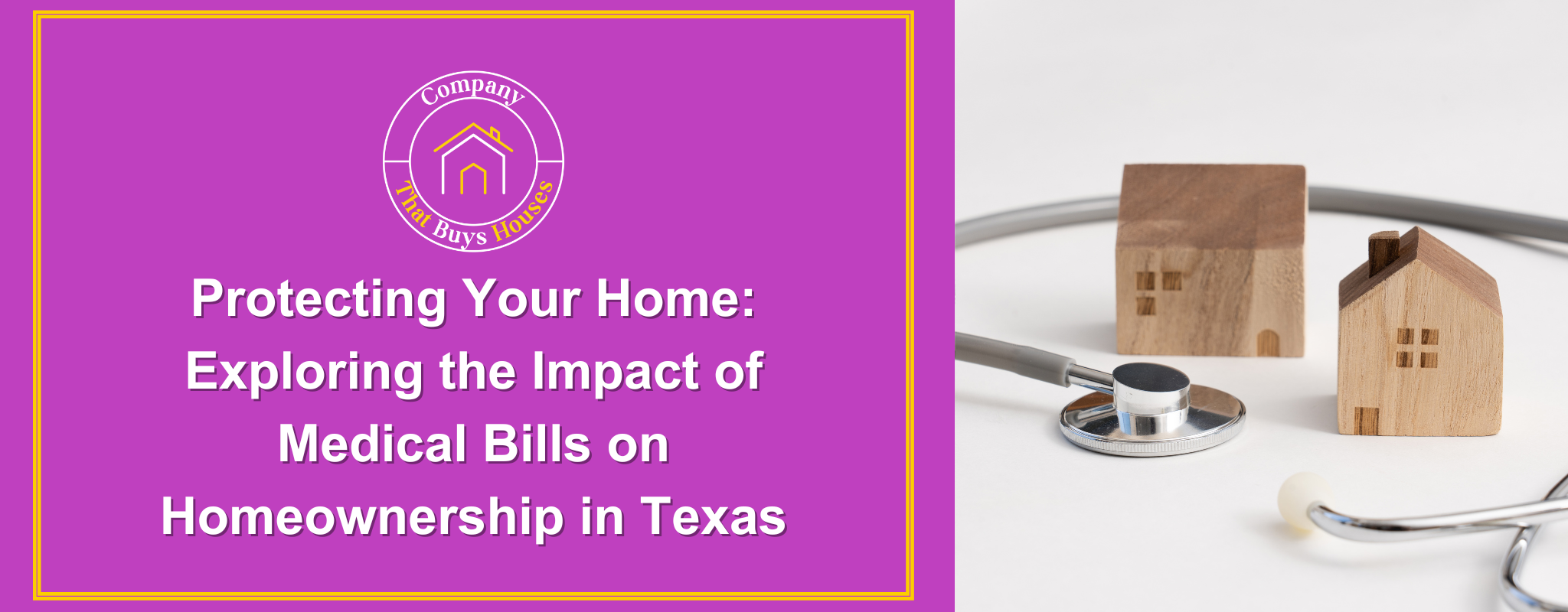
Understanding Medical Liens And Exempt Property In Texas
For homes in Texas, collecting medical debt can be scary and difficult. However, knowing the state’s rules on collecting medical debt can protect you in a big way.
Medical liens are important to understand because they let healthcare providers get paid for missed bills by putting a claim against a patient’s property. It is important to keep in mind that these liens do not apply to all property. Under Texas law, some assets cannot be seized.
The homeowner’s main home, personal things, and basic household items are all examples of exempt properties. Homeowners can keep their homes from being taken away because of medical debt collection by knowing medical liens and property that is not subject to them.
TABLE OF CONTENTS
- Real-Life Examples Of Individuals Facing Medical Debt And Collection Actions
- Frequently Asked Questions About Managing Medical Debt
- Taking Legal Action: Filing A Lawsuit Against Medical Debt Collectors
- Alternatives To Losing Your Home Due To Overwhelming Medical Bills
- Understanding Wage Garnishment & Writs Of Garnishment In Relation To Medical Debt
- Can Medical Bills Really Take Your House? Debunking Myths In Texas
- Negotiating Payment Plans And Settlements For Medical Debts
- Utilizing Bankruptcy As A Last Resort For Managing High Medical Bills
- Protecting Your Assets: Examining Homestead Exemptions In Different States
- The Role Of Insurance Coverage In Mitigating The Impact Of Medical Debt
- Seeking Assistance From Non-profit Organizations And Charitable Programs
- Preventing Surprise Bills: Knowing Your Rights As A Patient Under Federal Law
- Addressing Mental Health Issues Related To Unmanageable Medical Debt
- Taking Proactive Measures: Budgeting, Saving, And Planning For Potential Healthcare Costs
- Navigating Timely Billing To Avoid Surprise Medical Bills
- Strategies For Dealing With Medical Debt And Collections
- Exploring State-specific Laws And Protections Against Medical Debt
- How To Protect Your Home From The Risk Of Medical Debt
- The Impact Of Medical Debt On Credit Scores And Financial Stability
- What Happens If I Don’t Pay My Medical Bills In Texas?
- Can A Creditor Take My House In Texas?
- What Property Is Exempt From A Judgement In Texas?
- What Is Exempt From Debt Collection In Texas?
Real-Life Examples Of Individuals Facing Medical Debt And Collection Actions

Medical debt can be very hard on people and their families’ finances, especially in places like Texas, where the laws about collecting medical debt are hard to understand. It helps to look at real-life examples of people who have had to deal with medical debt and collection actions to understand better how these rules work.
So, Jane, a single mom in Dallas, got a $10,000 hospital bill after surgery she didn’t plan for. Even though she tried to work things out with the hospital, she had to file for bankruptcy because of the hospital’s aggressive collection measures.
In the same way, John from Houston had his wages taken away because he fell behind on paying for his daughter’s ongoing medical care. The harsh realities of medical debt are shown in these stories. They also show how important it is for people to know their rights and benefits under Texas law.
Frequently Asked Questions About Managing Medical Debt
Taking care of medical bills is one of the main worries of Texas homeowners.
With health care’s rising cost, it’s important to know the rules and laws about collecting medical debt to keep your home safe.
Here are some questions people often have about handling medical debt in Texas: How can a creditor help me if I can’t pay my hospital bills? Are they able to put a lien on my home? How long does a debt collector have to get paid for medical bills? What are my rights as a homeowner when it comes to being sued for medical debt? People who own their own homes may have these questions when dealing with medical bill collection.
You can better manage and protect your home from possible legal action if you know the facts and your rights.
Taking Legal Action: Filing A Lawsuit Against Medical Debt Collectors

It is important to know your rights and choices for going to court if medical debt collectors in Texas are being rude and annoying to you. Medical debt collectors in Texas are required by law to follow certain rules when they try to get people to pay their bills.
You might be able to sue them if they break these rules. This could include making fake threats of legal action, giving you false or misleading information, or calling you at odd times or places.
You can protect your home and financial safety while holding medical debt collectors responsible for their actions by suing them if they do these illegal things. Getting help from an experienced lawyer who knows how to deal with the complicated Texas rules about medical debt collection and will fight for your rights is very important.
Alternatives To Losing Your Home Due To Overwhelming Medical Bills
When Texas residents have a lot of medical bills, they may be afraid of losing their homes because debt collectors are so mean. There are, however, other ways to keep your home from being taken away.
You could talk to the medical provider or collecting agency about setting up a payment plan. This allows for manageable monthly payments and can prevent foreclosure on your property.
Another alternative is to seek legal assistance from a consumer protection attorney who can help navigate Texas’s complex laws surrounding medical debt collection. You can also explore options such as debt consolidation or bankruptcy, which can provide relief from mounting medical debt and safeguard your home from being taken away.
Knowing your rights and using these options can protect your home and ease the stress of having too many medical bills.
Understanding Wage Garnishment & Writs Of Garnishment In Relation To Medical Debt

To keep your Texas home safe from medical debt collectors, you need to know about pay garnishment and writs of garnishment. These are two popular ways for creditors to get money for unpaid medical bills.
A court order tells your employer to take money from your paycheck and send it straight to the creditor. This is called wage garnishment. On the other hand, writs of garnishment let your debtors take money out of your bank account to pay off the bill.
It is important to remember that Texas law limits both of these methods in some ways, like not taking away a certain amount of income or assets. If you know these rules, you can protect your home and your finances when medical debt collectors come after you for money.
Can Medical Bills Really Take Your House? Debunking Myths In Texas
There are a lot of false beliefs and misconceptions around medical debt collection in Texas, including the idea that you could lose your house. One widely held misconception is that your home may be seized if you have high medical expenses.
But this isn’t accurate. Texas has rules to shield homeowners from losing their houses due to unpaid medical bills.
These rules limit the power of creditors to file liens against a person’s primary dwelling and provide exemptions for homestead properties. To safeguard their houses and other assets, people must know these rules and their rights when dealing with medical debt collection.
Negotiating Payment Plans And Settlements For Medical Debts

Comprehending Texas medical debt collection rules regarding payment plans and settlements is important to safeguard your property from collection efforts. You can prevent future lawsuits and the seizure of your house for unpaid debt by negotiating a fair payment plan with debt collectors and healthcare providers.
It is crucial to be aware that medical providers in Texas are obligated by law to help patients who cannot pay their obligations in full with reasonable payment options. You also have the option to bargain for a settlement of your medical debts, which could lower the total amount you owe.
Finding a solution that benefits both of you requires initiative and communication with your debt collector or healthcare provider.
Utilizing Bankruptcy As A Last Resort For Managing High Medical Bills
Bankruptcy should be your last option to shield your house from Texas medical debt collectors. For those with excessive medical expenses, bankruptcy can be a relief, but it should only be considered a last resort.
This entails haggling for reduced costs or installment agreements with medical providers, applying for financial aid from government agencies or nonprofits, and examining the legitimacy of the debt being pursued. Additionally, speaking with a respectable bankruptcy attorney can facilitate understanding one’s rights and making wise financial decisions.
Ultimately, filing for bankruptcy should not be done hastily and should only be considered a last resort.
Protecting Your Assets: Examining Homestead Exemptions In Different States
It’s critical to comprehend state regulations protecting your house from medical debt collection. Homestead exemptions are among the special regulations in Texas that might assist in safeguarding your possessions.
Homeowners can shield a portion of the equity in their primary residence from creditors and debt collectors thanks to these exemptions. It’s crucial to remember that every state has its own set of rules regarding homestead exemptions, so you should do your homework and become familiar with them.
By utilizing these exclusions, you can protect your house and other assets against attempts to collect medical debt.
The Role Of Insurance Coverage In Mitigating The Impact Of Medical Debt
Medical debt can significantly burden homeowners, particularly in Texas, where debt collection regulations can be complicated. On the other hand, having sufficient insurance coverage can greatly lessen medical debt’s effect on your house and money.
Insurance policies that cover medical expenses and shield you from bearing the full cost of your bills include health insurance, homeowner’s insurance, and even auto insurance. Additionally, being aware of Texas’s unique regulations about medical debt collection will help you manage the problem and possibly even negotiate lower payments or the forgiveness of some debts.
Knowing your insurance coverage and legal rights will help you better guard against medical debt’s damaging impacts on you and your house.
Seeking Assistance From Non-profit Organizations And Charitable Programs

Knowing Texas’s rules on medical debt collection is essential if you own a house and want to keep it safe. However, contacting nonprofits and philanthropic programs for help can be a good choice if you are having trouble paying off medical debt and could soon face foreclosure.
These programs and organizations provide various services and resources that can help you deal with the complicated legal system and get financial assistance. These nonprofit organizations can be invaluable partners in defending your house against medical debt collection, including services like debt negotiation and consumer rights education.
They might also help you locate other sources of income or put you in touch with legal aid if you need more help. Please don’t be reluctant to contact these organizations if you need assistance protecting your house from the effects of excessive medical debt.
Preventing Surprise Bills: Knowing Your Rights As A Patient Under Federal Law
Knowing your rights as a patient in Texas about medical debt collection is essential to safeguarding your house. The federal law forbidding unexpected medical bills from out-of-network doctors is a crucial factor to consider.
Regardless of whether a provider is in-network, this law mandates that health insurance companies cover emergency services and any necessary follow-up care. Furthermore, patients are shielded from financial responsibility for costly out-of-network expenses by just having to pay their in-network portion of the cost.
By being informed of this federal law, patients can prevent unforeseen and expensive medical debt that might jeopardize their houses.
Addressing Mental Health Issues Related To Unmanageable Medical Debt

One’s mental health may be greatly impacted by medical debt, particularly if it becomes overwhelming. Texas has legislation protecting people against abusive medical debt-collecting practices.
However, to address any mental health difficulties associated with medical debt, it is imperative that you comprehend these rules and how they apply to your particular circumstances. Understanding your rights and options when interacting with medical debt collectors is critical to lessen the worry and anxiety of growing medical bills.
Consulting with a financial counselor or legal professional can offer significant assistance and direction in managing this intricate matter. By being proactive and knowledgeable, you can safeguard your house and yourself against the damaging consequences of overwhelming medical debt.
Taking Proactive Measures: Budgeting, Saving, And Planning For Potential Healthcare Costs
It is crucial for Texas homeowners to be aware of the possible effects that medical debt may have on their capacity to maintain their standard of living and the safeguards provided by state legislation. Making a budget and setting aside money for future medical expenses is one preventive step you can take to shield your house from medical debt collection.
This entails putting aside a certain percentage of your salary for medical costs and building up an emergency fund in case you incur unforeseen medical expenses. Furthermore, avoiding unmanageable debt accumulation can be achieved by making advance plans, such as investigating various healthcare solutions and comprehending coverage limitations.
By following these procedures, you may better prepare yourself for any future medical costs and shield your house from the damaging effects of medical debt collection.
Navigating Timely Billing To Avoid Surprise Medical Bills

It’s critical to comprehend Texas’s regulations regarding timely billing to safeguard your property against medical debt collection. Surprise medical expenditures frequently catch people off guard, which can cause financial strain and even raise the possibility of foreclosure.
However, Texas law mandates that medical professionals bill people within a specific time window and prohibits them from adding interest to unpaid amounts until sixty days have elapsed. Patients also have the right to contest any charges they feel are unjust or inaccurate.
You can handle prompt billing and prevent unforeseen debt collection attempts on your property by remaining aware of these rules and keeping track of your medical bills.
Strategies For Dealing With Medical Debt And Collections
It may be quite difficult to navigate the medical debt and collections world, particularly in Texas, where there are particular legal requirements. Homeowners can, however, employ certain precautions to shield their properties and themselves from the possible effects of unpaid medical expenses.
One important tactic is being proactive in learning about your options and rights to medical debt collection. This entails being aware of Texas’s four-year statute of limitations for medical debt and becoming acquainted with the Fair Debt Collection Practices Act, which specifies what debt collectors are permitted and prohibited from doing.
In addition, medical debts can be kept out of collections by arranging payment plans or negotiating with healthcare providers. It’s crucial to routinely check your credit record and challenge any errors about medical debt.
Texas homeowners can effectively manage and safeguard themselves from medical debt collections by being knowledgeable and taking appropriate action.
Exploring State-specific Laws And Protections Against Medical Debt
When protecting your home from medical debt collection, it is important to understand the specific laws in your state. In Texas, several laws and protections are in place to help individuals facing medical debt.
For example, the Texas Medical Debt Collection Act limits the interest that can be charged on medical debts while requiring collection agencies to provide detailed information about the debt and its validity. Additionally, under the Homestead Exemption law in Texas, a person’s primary residence is protected from being seized for medical debt repayment.
It is crucial for individuals in Texas to familiarize themselves with these laws and protections to safeguard their homes from potential medical debt collection efforts.
How To Protect Your Home From The Risk Of Medical Debt
Texas homeowners face a serious risk from medical debt since it may result in the loss of their properties. Nonetheless, you can lessen the risk to your house by being aware of the state’s regulations regarding recovering medical debt.
The Texas Homestead Exemption, which enables homeowners to shield a portion of their home’s worth from creditors, is one significant law to be aware of. Knowing the Fair Debt Collection Practices Act will also assist you in identifying and averting any unethical or unlawful debt collection practices.
Maintaining thorough documentation of all medical bills and payments is also essential since these will be useful should you need to refute any erroneous charges. In conclusion, obtaining expert legal counsel and investigating alternative solutions like settling on a payment schedule or requesting financial aid might moreover offer to safeguard against the possibility of medical debt affecting your residence.
You may protect your house and financial security by being proactive and knowledgeable about Texas’s laws on medical debt collection.
The Impact Of Medical Debt On Credit Scores And Financial Stability

Medical debt can have a significant impact on an individual’s credit score and overall financial stability. In Texas, there are laws in place to protect homeowners from aggressive medical debt collection practices.
However, it is important for homeowners to understand these laws and how they can affect their credit scores. Medical debt can lower a person’s credit score, making it difficult for them to obtain loans or credit in the future.
This can also lead to financial instability, as high levels of medical debt can make it challenging to keep up with other bills and expenses. By understanding Texas laws on medical debt collection, homeowners can take steps to protect their credit scores and maintain financial stability.
What Happens If I Don’t Pay My Medical Bills In Texas?
If you are struggling to pay your medical bills in Texas, it is important to understand the state’s laws on medical debt collection. Failure to pay your medical bills can have serious consequences, including damage to your credit score and potential legal action from creditors.
In Texas, medical debt is treated like any other type of debt, meaning that creditors have the right to pursue collection through wage garnishment or placing a lien on your property. However, consumer protections exist, such as a statute of limitations on how long creditors have to sue for unpaid medical bills.
Educating yourself on these laws and exploring options for managing and negotiating your medical debt to protect yourself and your home from potential financial hardships is crucial.
Can A Creditor Take My House In Texas?

When faced with mounting medical debt, homeowners in Texas may fear losing their homes to creditors. However, it is important to understand the laws protecting homeowners from such situations.
In Texas, a creditor cannot seize your primary residence for medical debt collection, as it is considered a homestead protected by state law. This means your home cannot be used as collateral or sold off to pay medical debts.
Additionally, Texas has strict guidelines for wage garnishment and bank account freezes, providing further protection for homeowners. It is crucial to familiarize yourself with these laws and seek legal advice if facing potential home loss due to medical debt collection.
What Property Is Exempt From A Judgement In Texas?
When protecting your home from medical debt collection in Texas, understanding the state’s laws on property exemptions is crucial. In Texas, certain properties are exempt from judgments, meaning they cannot be seized or sold to satisfy a medical debt.
These exemptions include a homestead, which is protected up to 10 acres in a rural area or one acre in an urban area. Personal property such as clothing, household furnishings and appliances, and tools used for trade or business are also exempt.
Knowing these exemptions and how they apply to your specific situation is important to defend your home against medical debt collection efforts effectively.
What Is Exempt From Debt Collection In Texas?
When protecting your home from debt collection in Texas, it’s important to understand what is exempt under state laws. In Texas, several exemptions can shield your home from being seized by creditors for medical debt.
These include the homestead exemption, which protects a certain amount of equity in your primary residence, and the personal property exemption, which covers furniture, clothing, and appliances. Additionally, assets such as retirement accounts and life insurance policies may be exempt from debt collection in Texas.
By familiarizing yourself with these exemptions and working with a knowledgeable attorney, you can protect your home from aggressive medical debt collectors.
These medical bills and liens findings apply to all counties and cities in Texas, including Dallas, Fort Worth, Arlington, Houston, San Antonio, and Austin.
Get An Offer Today, Sell In A Matter Of Days
Related Posts:
How To Become Administrator Of Estate In Texas
How Long Does An Eviction Process Take In Texas
How Long Does A Foreclosure Take In Texas
| CONSUMER CREDIT | LENDER | NONPROFIT | LIENHOLDER | DEBTOR | UNINSURED |
| INSURED | INSURER | CAR LOANS | LENDERS | MEDICAL BILLING | JUDGMENT |
| CREDIT REPORTING | TAX | TAXES | TAXING | TAXATION | MONEY |
| U.S. | THE UNITED STATES | GARNISH WAGES | LAWYERS | SOCIAL SECURITY | SOCIAL SECURITY BENEFITS |
| RETIREE | REGULATORY | OVERSIGHT | INJURIES | INJURY | FORECLOSING |
| FEDERAL GOVERNMENT | FEDERAL LEVEL | DATA | CREDIT REPORTS | UNSECURED | UNSECURED DEBTS |
| STUDENT LOANS | MARYLAND | UNINSURED PATIENTS | UNINSURED AND UNDERINSURED | UNDERINSURED | EMERGENCIES |
| CREDIT CARD | CREDIT BUREAUS | CALIFORNIA | SPOUSAL SUPPORT | ALIMONY | MAINE |
| HOME EQUITY LOANS | HOME EQUITY | REPOSSESSION | REPOSSESSED | REPOSSESS | PERSONAL INJURY CLAIM |
| PERSONAL INJURY | PAYCHECK | IRS | THE INTERNAL REVENUE SERVICE (IRS) | FEES | CHILD SUPPORT |
| CHILD | FEDERAL STUDENT LOANS | LIBRARY | LAW FIRM | JUDGMENT-PROOF | INCOME TAXES |
| STATE AGENCY | FLORIDA | EMAILS | DEBT RELIEF | DEBT FORGIVENESS | CONSUMER DEBTS |
| COMPLAINT | WORKER’S COMPENSATION | WORKER’S COMPENSATION | REFINANCING | RETIREMENT PLANS | MORTGAGE |
| MORTGAGE LOAN | LAW LIBRARY | INTEREST RATE | HEALTH CARE PROVIDERS | FINANCIAL MANAGEMENT | FEDERAL TRADE COMMISSION |
| THE FEDERAL TRADE COMMISSION (FTC) | FAQS | ILLNESS | CREDIT CARD DEBT | PROTECT CONSUMERS | CONSUMER PROTECTION LAWS |
| CHAPTER 7 | CHAPTER 7 BANKRUPTCY | CHAPTER 13 | CHAPTER 13 BANKRUPTCY | A DEBT COLLECTOR | DEBT COLLECTION THIS |
| ALL RIGHTS RESERVED | BEING TAKEN BY CREDITORS |

![Trustworthy Cash Home Buyer [market_city] [market_state]](https://image-cdn.carrot.com/uploads/sites/75713/2024/01/Trustworthy-Cash-Home-Buyer.png)